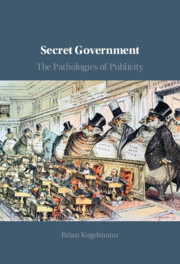Book contents
- Secret Government
- Secret Government
- Copyright page
- Dedication
- Contents
- Tables
- Acknowledgments
- Introduction
- Chapter 1 Publicity in History
- Chapter 2 Democracy Thrives in Darkness
- Chapter 3 Open versus Closed Deliberation
- Chapter 4 Publicity and the Rule of Law
- Chapter 5 Government House Moral Theory
- Chapter 6 Seeing Justice Done
- Chapter 7 Mutual Knowledge of Justice
- Chapter 8 Putting the Philosopher in the Model
- Conclusion
- References
- Index
Chapter 1 - Publicity in History
Published online by Cambridge University Press: 04 November 2021
- Secret Government
- Secret Government
- Copyright page
- Dedication
- Contents
- Tables
- Acknowledgments
- Introduction
- Chapter 1 Publicity in History
- Chapter 2 Democracy Thrives in Darkness
- Chapter 3 Open versus Closed Deliberation
- Chapter 4 Publicity and the Rule of Law
- Chapter 5 Government House Moral Theory
- Chapter 6 Seeing Justice Done
- Chapter 7 Mutual Knowledge of Justice
- Chapter 8 Putting the Philosopher in the Model
- Conclusion
- References
- Index
Summary
This chapter develops a selective genealogy of the concept of publicity as it appears throughout the history of political thought, beginning with Plato and ending with Henry Sidgwick. Beyond its intrinsic interest, there is instrumental value to tracing a genealogy of publicity. Two benefits stand out in particular. First, by looking to what the giants of the past had to say about transparency in government, we find a greater diversity of positions than we currently see. Some flatly reject openness in government, embracing opacity in its place. And second, looking to the past shows how the concept of publicity can take on many different forms. Sometimes it refers to being offered justifications for the laws one lives under, sometimes it means that persons must have access to the philosophical theories inspiring the political systems they inhabit, sometimes it is used as a kind of test to probe the morality of public policies, sometimes it means that persons should be able to carefully monitor what public officials are up to, and so on.
- Type
- Chapter
- Information
- Secret GovernmentThe Pathologies of Publicity, pp. 11 - 34Publisher: Cambridge University PressPrint publication year: 2021

